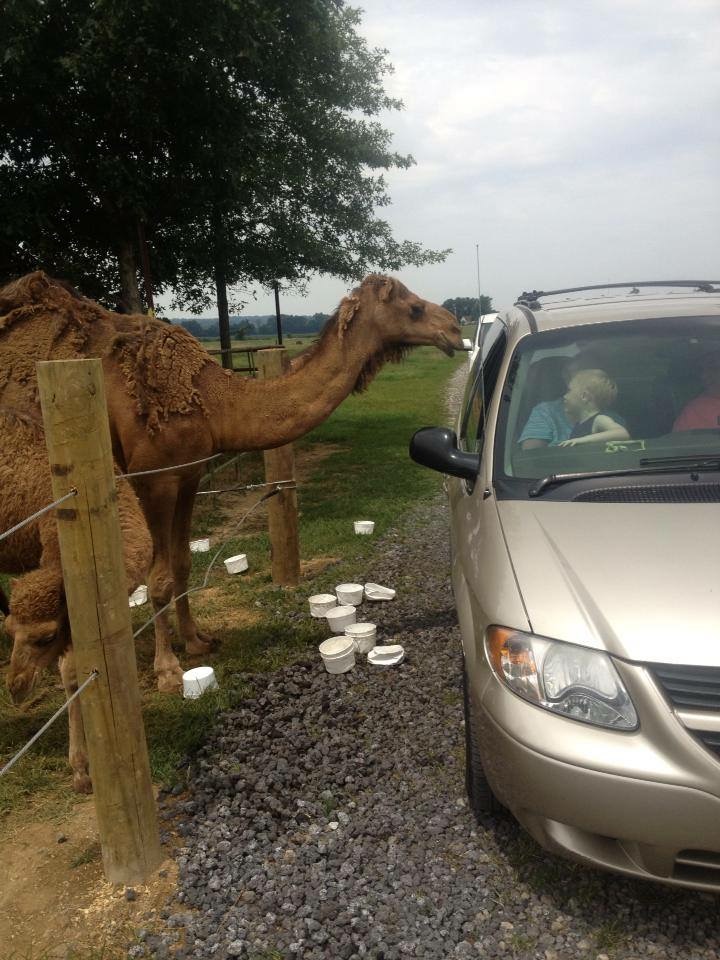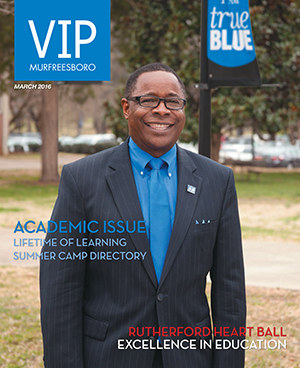VIProfile: Tennessee Safari Park
/A Walk & Drive Through Zoo
Story by Lyda Kay Ferree, The Southern Lifestyles Lady. Photography courtesy of the Tennessee Safari Park
At least once a year, typically in October when VIP Jackson Magazine profiles Crockett County, I visit the Tennessee Safari Park. I enjoy driving down the country road that leads to Hillcrest, a Century Farm owned by the Conley family since 1858. Pretty peacocks preen and have full reign of the road. My car moves slowly as I try to avoid a run-in with a peacock.
On my first visit to Safari Park I was invited to feed Jerry, the giraffe. Needless to say, Jerry is a very tall animal, and I wasn’t so sure I wanted to do this, but fortunately for me, Jerry was well behaved.
The Conley Farm has produced numerous types of crops and has always been entrepreneurial in the products that were developed and sold on the farm.
Claude H. Conley I instilled a strong interest in his son, Claude M. Conley, at a very young age to love and appreciate Hillcrest, the Conley family and all of its animals.
They collected pheasants, peafowl and various types of deer. This was a pivotal moment in the young man’s life, and he knew he wanted to see animals from around the world saved and protected on the family farm.
Over the years the collection grew as bison were added in 1936. According to the Conleys, this was the first privately owned bison in the state of Tennessee. Damara zebras were added in 1980 and various rare and endangered antelope were added throughout the 1980s and 1990s.
In 2007 Claude Sr. and his two sons, Claude H. Conley II and Jon Wesley Conley, decided to create a park to showcase these rare and endangered species and bring a top tourist attraction to the West Tennessee rural farm. Today the Safari Park has one of the largest collections of zoo animals in the state.
Their plans to bring rare and endangered animals from around the world and showcase them throughout their large farm has been met with tremendous success! Today you may drive 3.5 miles through roads taking you amongst animals from around the world, then take a walk through the zoo area and see primates, exotic birds, tapirs, cranes and more.
VIP: What was the initial goal of what is now the Tennessee Safari park?
Claude H. Conley II: We always wanted to open a zoo to preserve the property and the animals. My boys are the sixth generation to be here on this property. Their ages are 8, 3 and a few months old (My youngest child was born April 20.)
VIP: Has the Park surpassed the goal of your family?
CC: It is getting there. We always thought the Park would meet our goals. We are hoping that it will continue to get bigger and bigger. We have seen a steady increase of visitors each year since we opened. The first year we had about 2500 visitors. Last year 100,000 visitors came to our Park!
We get a lot of business off I-40 and I-55 with our billboards. I-40 is one of the busiest interstates in the country. People come from all over the country.
VIP: The Safari Park is both entertaining and educational, isn’t it?
CC: Yes, most children and adults come away from the Park having learned something new about animals or they have seen animals they have never seen before and observed them in their habitat. We have over 10,000 exotic animals in our Safari Park.
VIP: How many employees does it take to run an attraction of this size?
CC: 10 plus 6 family members who are here 7 days a week. It is hard work! My brother, Dad and I divide the duties. I do the feeding, the bookkeeping, and I manage the park and deal with customers. My mother is in the gate house greeting our guests and selling tickets.
VIP: Talk about the grounds of the Safari Park.
CC: We have over 100 different types of trees. The landscaping is done by my brother, Jon Wesley. We have one of the rarest collections of trees and exotic animals in the state of Tennessee.
VIP: Do some animals never adjust to the West Tennessee climate and habitat?
CC: We do a lot of research before we bring animals to our park. We have heated facilities for animals that need it in the winter. Unlike a zoo, babies are born at Safari Park almost every day.
VIP: What are your sources for animals?
CC: We deal with zoos and Safari Parks all over the country. Zoos have no room to expand. Most zoos are on 30-50 acres. We have over 750 acres here. That is why zoos give them to us. We bring animals in from every state in the United States and outside the states. Most of the animals we get are from Arizona, Utah, California, and New York.
VIP: Is there a lot of legal paperwork for the managers of Safari Parks?
CC: Yes, there is a lot of paperwork to get these animals here. We keep a veterinarian from Memphis on retainer.
VIP: Your plans to bring rare and endangered animals from around the world and showcase them through your large farm has been met with tremendous success, haven’t they?
CC: Yes, today you can drive 3.5 miles through roads that take you amongst animals from around the world, then walk through the zoo area and see primates, exotic birds, tapirs, cranes and more. Visitors may go around the park as many times as they desire and all of the animals will eat from your car windows if you drive through the Safari Park.
VIP: What are the most popular animals and the most exotic animals for visitors to see?
CC: Goats, giraffes, tapirs, camels and antelope are the most popular and the most exotic animals are the rare and endangered antelopes from Addax, Africa; Gemabok antelope, also from Africa; and tons of tapirs. You may buy a special exotic feed at the gate and some of the animals will eat from your hands.
VIP: The park is always expanding. Talk about your plans for expansion in Crockett County.
CC: We are adding 100 more acres. My brother and I purchased the property that adjoins our family property. If the weather is good and it isn’t raining, we will open the new area during Memorial Day Weekend. A new giraffe is coming. In the next year or two we will get five more giraffes. We will have new water buffaloes, Gayal cattle, which are very rare (We’re the only ones in the country that have these cattle) from Africa. We will add about 100 new animals in the park addition.
VIP: Tell our readers about your gift shop and Safari Grill.
CC: We sell educational and fun gift items, T-shirts, stuffed animals and zoo books. Anything with our logo on it sells very well.
In the Safari Grill we sell burgers, hot dogs, nachos, snow cones and cold drinks. Visitors may bring a picnic any time. The picnic tables are first come, first served, but there are many picnic tables.
VIP: Talk about your field trips at the Park.
CC: Field trips pep up the class with a new way to learn about biology and wildlife. Our Park’s main goal is to spread our mission about wildlife conservation. And what better way than teaching it to our next generation! That is why we offer a discounted rate to our school systems. Our field trips include a guided tour of our Safari and zoo and two petting zoo feedings (giraffe and pygmy goats). School group rates are applicable only to accredited schools, pre-schools, year-round day cares and organized home schools. Church groups, Vacation Bible School and summer camps enjoy our field trips.
VIP: What is the advantage of riding on a Safari bus?
CC: On the tour buses you can get closer to animals than if you were in your vehicle. We require a minimum of 15 people to rent our Safari Bus. The passengers are taken on a 30-minute adventure ride with an experienced guide telling the guests about the animals.
VIP: What do the kids most enjoy at your Safari Park?
CC: They like to be up close and personal with animals or face to face with them, feeding them, something they don’t get to do at zoos. Everybody has a great time! I believe that is why a Safari Park is so popular. Our Facebook page has grown to over 30,000 fans!
VIP: What are the busiest seasons at the Park?
CC: Spring break (2nd week in March) and we are busy until Thanksgiving. After August the fall is usually really busy too.
VIP: Has the Park met the expectations of you and your family?
CC: It has exceeded our expectations. In fact, we are planning to open a second Safari Park, this one in Cheatham County 15 minutes from Nashville.
What to Know
Tennessee Safari Park
618 Conley Road, Alamo, TN 38001
(731) 696-4423
www.tennesseesafaripark.com
Facebook: Tennessee Safari Park
Summer Hours: Mon-Sat: 11am–5pm; Sun: 12 noon–5pm
Ticket Prices: Adults: $12; Children: $8



















































